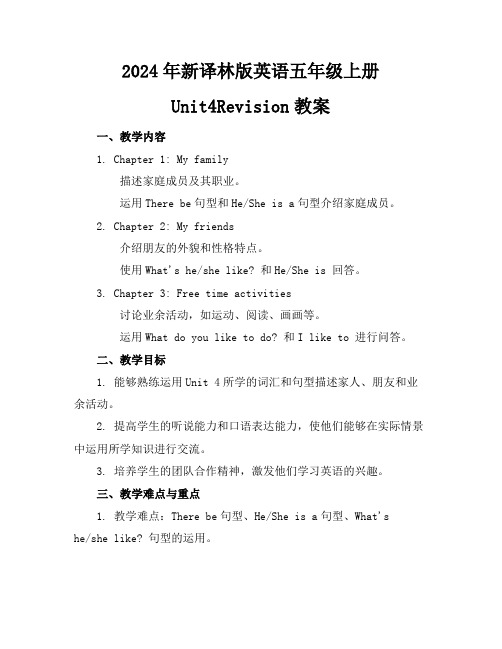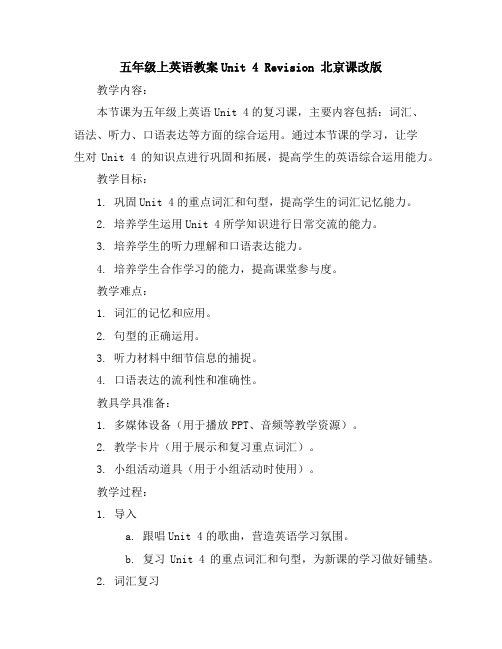Book5 m4 Revision 学案
2024年新译林版英语五年级上册Unit4Revision教案

2024年新译林版英语五年级上册Unit4Revision教案一、教学内容1. Chapter 1: My family描述家庭成员及其职业。
运用There be句型和He/She is a句型介绍家庭成员。
2. Chapter 2: My friends介绍朋友的外貌和性格特点。
使用What's he/she like? 和He/She is 回答。
3. Chapter 3: Free time activities讨论业余活动,如运动、阅读、画画等。
运用What do you like to do? 和I like to 进行问答。
二、教学目标1. 能够熟练运用Unit 4所学的词汇和句型描述家人、朋友和业余活动。
2. 提高学生的听说能力和口语表达能力,使他们能够在实际情景中运用所学知识进行交流。
3. 培养学生的团队合作精神,激发他们学习英语的兴趣。
三、教学难点与重点1. 教学难点:There be句型、He/She is a句型、What'she/she like? 句型的运用。
2. 教学重点:家庭成员、朋友、业余活动等词汇和句型的复习巩固。
四、教具与学具准备1. 教具:PPT、卡片、录音机、磁带。
2. 学具:练习本、彩色笔。
五、教学过程1. 导入(5分钟)利用PPT展示不同家庭、朋友和业余活动的图片,引导学生回顾Unit 4所学的词汇和句型。
2. 实践情景引入(10分钟)分成小组,让学生用There be句型介绍自己的家庭成员。
选取几名学生上台展示,其他学生认真听并给予评价。
3. 例题讲解(15分钟)出示关于朋友外貌和性格特点的例题,引导学生使用What's he/she like? 和He/She is 进行问答。
对学生的回答进行点评,纠正发音和语法错误。
4. 随堂练习(10分钟)让学生根据所学内容,用I like to 句型谈论自己的业余活动。
组织学生进行小组讨论,互相提问,巩固所学知识。
二年级英语book4revision的教学设计

二年级英语Book 4 Revision的教学设计这是一篇由网络搜集整理的关于二年级英语Book 4 Revision的教学设计的文档,希望对你能有帮助。
1. Review the greetings.2. Review the words and sentences in unit three and four.3. Students use the colours correctly.教学重、难点1. The words:red,blue,yellow,green,pink,purple,brown,orange.2. The sentences:What colour is it?It is...媒体设计Pictures.教学过程设计Step 1. Greetings.T:Class begins.Ss:Stand up.T:Good afternoon,children.Ss:Good afternoon,Miss Yu.T:How are you?Ss:Fine,thank you. And you?T:I‘m fine,too. Sit down,please.Step 2. Revision.1.T:What colour is it?Read the sentence after the teacher and read one by one.2. Show a picture of red.T:What colour is it?S1:Red.Read after the teacher and read one by one.3. Review the other words like this.Blue,yellow,green,pink,purple,brown,orange.4. Read all the words after the teacher and read together.5. Ask and answer.T:What colour is it?S2:Green.T:What colour is it?S3:Brown.Students work in pairs to practise the sentence structure.6. Play a game:Tick-Tack-Toe.For example:T:What colour is it?S4:It is red. It is an apple.Students work in groups and act the dialogues.7. Show a picture of a postman.T:Is he a postman?Read the word:postman.Show the sentence and read after the teacher.Read together and read one by one.T:He is a postman.Read the sentence.8. Show a picture of a policeman.T:Is he a policeman?Read the word:policeman.Show the sentence and read after the teacher. Read together and read one by one.T:He is a policeman.Read the sentence.9. Review the other words and sentences like this. Driver. Is he driver?He is a driver.Fireman. Is he a fireman?He is a fireman. Milkman. Is he a milkman?He is a milkman. 10. Show all the words and read together.Read the sentences on page twenty.Step 3. Say goodbye.T:Class is over.Ss:Stand up.T:Goodbye,children.。
新译林版英语五年级上册Unit4Revision优质教案

新译林版英语五年级上册Unit4Revision优质教案一、教学内容本节课我们将复习新译林版英语五年级上册Unit 4内容。
具体包括:Reading部分故事"Goldilocks and the Three Bears",Grammar 部分一般过去时,以及Words部分相关词汇。
通过本节课学习,让学生更好地掌握过去时用法,提高阅读理解和口语表达能力。
二、教学目标1. 让学生能够熟练地运用一般过去时描述过去发生事情。
2. 帮助学生掌握故事"Goldilocks and the Three Bears"主要内容,提高阅读理解能力。
3. 培养学生口语表达能力,能够运用所学词汇和句型进行简单情景对话。
三、教学难点与重点1. 教学难点:一般过去时构成和用法,以及故事中长句子理解。
2. 教学重点:熟练运用一般过去时描述过去发生事情,掌握故事主要内容和相关词汇。
四、教具与学具准备1. 教具:PPT,单词卡片,故事图片,录音机。
2. 学具:学生用书,练习册,文具。
五、教学过程1. 导入:通过展示一组图片,引导学生回忆起Unit 4学习内容,激发学生学习兴趣。
2. 阅读理解:让学生阅读故事"Goldilocks and the Three Bears",并回答相关问题。
针对长句子进行解析,帮助学生理解故事内容。
3. 例题讲解:针对Grammar部分一般过去时,给出例句,解释用法,并进行讲解。
4. 随堂练习:让学生运用一般过去时,完成练习册上相关习题。
5. 口语练习:分组进行角色扮演,运用所学词汇和句型进行情景对话。
六、板书设计1. Goldilocks and the Three Bears2. 一般过去时:主语+动词过去式3. 重点词汇:bears, girl, bed, chair, porridge, hot, cold, Goldilocks七、作业设计1. 作业题目:根据课堂所学,编写一段关于你过去发生事情短文。
五年级上英语教案-Unit4Revision北京课改版

五年级上英语教案Unit 4 Revision 北京课改版教学内容:本节课为五年级上英语Unit 4的复习课,主要内容包括:词汇、语法、听力、口语表达等方面的综合运用。
通过本节课的学习,让学生对Unit 4的知识点进行巩固和拓展,提高学生的英语综合运用能力。
教学目标:1. 巩固Unit 4的重点词汇和句型,提高学生的词汇记忆能力。
2. 培养学生运用Unit 4所学知识进行日常交流的能力。
3. 培养学生的听力理解和口语表达能力。
4. 培养学生合作学习的能力,提高课堂参与度。
教学难点:1. 词汇的记忆和应用。
2. 句型的正确运用。
3. 听力材料中细节信息的捕捉。
4. 口语表达的流利性和准确性。
教具学具准备:1. 多媒体设备(用于播放PPT、音频等教学资源)。
2. 教学卡片(用于展示和复习重点词汇)。
3. 小组活动道具(用于小组活动时使用)。
教学过程:1. 导入a. 跟唱Unit 4的歌曲,营造英语学习氛围。
b. 复习Unit 4的重点词汇和句型,为新课的学习做好铺垫。
2. 词汇复习a. 利用教学卡片,带领学生复习Unit 4的重点词汇。
b. 设计游戏或竞赛,激发学生学习兴趣,巩固词汇记忆。
3. 句型复习a. 通过PPT展示Unit 4的重点句型,引导学生进行跟读和模仿。
b. 设计情境,让学生运用Unit 4所学句型进行角色扮演,提高口语表达能力。
4. 听力训练a. 播放Unit 4的听力材料,让学生捕捉关键信息,提高听力理解能力。
b. 设计听力练习题,检测学生的听力水平。
5. 小组活动a. 将学生分成小组,进行Unit 4话题相关的讨论或任务。
b. 每组选代表进行汇报,提高学生的合作能力和口语表达能力。
6. 课堂小结b. 鼓励学生课后继续复习和巩固所学知识。
板书设计:Unit 4 Revision1. 重点词汇:……2. 重点句型:……3. 听力技巧:……4. 口语表达:……作业设计:1. 抄写Unit 4的重点词汇和句型,加强记忆。
新译林版英语五年级上册Unit4Revision教案

新译林版英语五年级上册Unit4Revision教案一、教学内容本节课为新译林版英语五年级上册Unit 4 Revision。
教学内容包括:复习Unit 4中的单词、短语、句型以及语法知识点。
具体章节为:Unit 4的故事、活动手册和练习册相关内容。
二、教学目标1. 能熟练掌握Unit 4的重点单词、短语和句型,并能运用到实际情景中。
2. 能够运用一般现在时描述人物的日常活动。
3. 提高学生的听说读写能力,培养合作学习的能力。
三、教学难点与重点教学难点:一般现在时的运用,描述人物的日常活动。
教学重点:Unit 4的重点单词、短语和句型的掌握。
四、教具与学具准备教具:PPT、单词卡片、录音机学具:活动手册、练习册、笔记本五、教学过程1. 导入:通过播放Unit 4的故事,引导学生复习本单元的重点单词和句型。
2. 新课内容呈现:a. 通过PPT展示Unit 4的重点单词和短语,带领学生朗读和拼写。
b. 利用单词卡片,进行小组竞赛,巩固单词记忆。
c. 通过例句,讲解一般现在时的用法,引导学生进行句型练习。
3. 实践情景引入:a. 播放一段动画,展示人物日常活动,让学生运用一般现在时进行描述。
b. 学生分角色扮演,进行情景对话练习。
4. 例题讲解:a. 出示练习题,讲解一般现在时的用法。
b. 学生独立完成练习题,教师进行解答和指导。
5. 随堂练习:a. 学生完成活动手册和练习册的相关练习。
b. 教师对学生的作业进行批改和反馈。
六、板书设计1. Unit 4 Revision2. 内容:a. 重点单词和短语b. 一般现在时的句型结构c. 例题和答案七、作业设计1. 作业题目:a. 抄写Unit 4的重点单词和短语。
b. 根据所给情景,运用一般现在时编写对话。
2. 答案:八、课后反思及拓展延伸1. 反思:本节课通过复习Unit 4的内容,巩固了学生的单词和语法知识。
在实践情景引入环节,学生的参与度较高,但部分学生在句型运用方面仍有困难,需要在今后的教学中加强练习。
Review M4 教学设计

Review Module 4教学目标:1.能听、说、认读下列单词:picnic, great, take, ball, why, because, so, weather, hot, cold, sunny, snow, rain, windy等。
2.能听懂、会说下列句型:“Will you take your kite?”–“Yes, I will./No,I won’t.”以及Will it be hot in Haikou? –Yes, it will. / No,it won't.的语言结构。
3.语法知识:一般将来时的基本构成和用法。
教学重点:对一般将来时的初步掌握以及新单词相关语句在实际生活中的应用,并学会用一般将来时表示今后的打算和计划。
教学难点:掌握两种用一般将来时描述未来天气的句式,并运用在实际生活中。
教学过程:一、选出每组单词中不同类的一项。
()1. A. cold B. shy C. clever()2. A. queen B. king C. kite()3. A. windy B. sunny C. puppy()4. A. good B. great C. food()5. A. them B. I C. him二、单项选择。
()1. What is he _______ to do?A. goesB. goingC. go()2. —Will it be snowy next Monday?—Yes,_______.A. it isB. it doesC. it will ()3. There _______ a pen and two pencils on the desk.A. isB. areC. no ()4. —Whose book is it?—It’s _______.A. mineB. myC. me ()5. He will _______ his grandpa.A. lookB. visitC. see三、判断下列图片与句子描述是(T)否(F)一致。
高中英语Revision (unit 1—5 of Book 5)人教版第五册

高中英语Unit1-5 of Book 5 复习教案人教版第五册I.TopicsUnit 1:How to organize a scientific research;contributions of scientistsUnit 2:Countries of the United Kingdom; Union Jack;famous sites in LondonUnit 3:Predicting the good and bad changes in the future; alien creaturesUnit 4:The basic procedures of making the news;newspapers and TV programmesUnit 5:Medicine; first aid; safety in the home;medicationII.Words and expressionsUnit 1:Words: engine characteristic radiumtheory scientific examineconclude conclusion analyserepeat defeat attend exposecure control absorb severevaluable pump pub blameimmediately handle additionlink announce instruct virusconstruction positive strictmovement god God backwardcomplete spin enthusiasticcautious reject viewExpressions: steam engine put forwardmake a conclusion in additionlink …to…apart from (be)strict with lead to make sensepoint of viewUnit 2:Words: unite kingdom consist dividepuzzle debate clarify relationlegal convenience attractioncollection construct influenceproject arrange wedding foldsightseeing available delighttower royal uniform splendidstatue communism thrill potunfair smart suggestion tenseconsistent errorExpressions: consist of divide…intobreak away (from) leave out takethe place of break downUnit 3:Words: vehicle carriage mud bathroomtemple private settlementimpression constant constantlyremind jet previous tabletcapsule opening surroundinglack ache mask bend pressswift swiftly master sightflash switch optimistic lengthextraordinary extraordinarilyhelmet assist agency skiprequire cocoa lemonade herb Expressions: take up remind of losesight of …catch sight of …sweep up speed up assist inspace agencyUnit 4:Words: occupation reporter professionphotograph photographercolleague eager concentrate courseacquire meanwhile traderecorder case accuse deliberatelyguilty section technicaltechnically thorough gifted defendcrime normal seldom departmenttask accurate employ polish notechief approve process intentionappointment seniorExpressions: concentrate on accuse...ofso as to defend againstUnit 5:Words: aid illness injury bleed ankle choke blood bloody burn organpoison ray treatment liquidradiation mild mildly iron tissueelectric swell swollen damagejewellery squeeze wound bandagesymptom kettle wrist damp sleevethroat present (v.) ceremony braverytowel pressure ambulance authenticessayExpressions: first aid fall ill electricshock squeeze out over and overagain in place a number of putone’s hands onIII.Functional itemsUnit 1:Describing people: characteristics and qualitiesHow will I recognize you?You can recognize me because…What will you wear?I will wear a …What do you look like?What special features do you have?I’m tall /short, fat/thin, young/ old….How will I know you?I have large /small, brown/green/black eyes with…Unit 2:1). Language difficulties in communicationExcuse me. I’m afraid I can’t follow you.Can you speak more slowly, please?I beg your pardon? Pardon?What did you mean by…?I didn’t understand…I’ m sorry, but could you repeat that? 2). Space—position, direction, distance)Wales was linked to …England and Wales were joined to /connected…England is divided into three zones.The zone nearest…is called…The middle zone is called…Unit 3:1). Making predictionsDo you suppose that…?Suppose that…I wonder if…Do you imagine that…?I imagine that …2). Making conjectures about futureIs it likely /unlikely that…Possibly…It is possible that …Most likely…I’m sure ….Probably…Suppose that …Probably…Perhaps…Maybe…Unit 4:Making appointmentsAShall we make an appointment?When are you free?Is it possible to…?Where is the best place?When do you think is convenient for you?How about…?Which day would suit you best?Where would you like to meet?What time would be most convenient?Please, can you tell me…?BI shall be busy at …and … but I can be free at…Maybe we can meet at…Perhaps we could…I would like to arrange…I suggest we meet…I may be able to see you at…That will/ won’t be convenient because…I can/ can’t do that because…I look forward to seeing you.Unit 5:Giving instructionsWhat should he do? If you/he/…, you might be…Why should he…? Tell him to…What about this…? If there is a pulse, check her breathing.What if…? Continue…until…And then what? Now, if there is no…, you must…You’ve got to… Do not put….First you have to … Then … Next…Never put…IV.GrammarUnit 1:The Past Participle as the Attribute and the PredicativeSo many thousands of terrified people died.(Attribute)But he became inspired when he…(Predicative)Unit 2:The Past Participle as the Object Complement …the three countries found themselves united peacefully……he had them killed while they were asleep. Unit 3:The Past Participle as the attributiveI followed him to collect a hovering carriagedriven by computer.Tomorrow you will be ready for some visits organized by the company.The past participle as the adverbialWorried about the journey, I was unsettled for the first few days.Confused by the new surroundings, I was hit by the lack of fresh air.Exhausted, I slid into bed and fell fast asleep.Unit 4:InversionNever will Zhou Yang forget his assignment at the office of China Daily.Only when you have seen what he or she does, can you cover a story by yourself.Not only am I interested in photography, but…Only if you ask many different questions will you acquire all the information you need to know.Unit 5:EllipsisYou can get burnt by hot liquids and (you can get burnt by) steam.First degree burns turn white when (they are) pressed.。
B5M4 Carnival Revision 导学案1

B5M4 Carnival RevisionⅠ. Teaching aims:1. Get Students to review the important words.2. Consolidate the usage of key phrases and sentences.3. Enable students to learn how to describe festivals.Ⅱ. Important point:Enable students to master the useful expressions about festivals and the usage of key phrases and sentences.Ⅲ. Difficult point:Make a conversation about how to celebrate the Spring Festival based on these expressions.Teaching procedures:Step1. Words Revision1. Let’s read1. develop v. 发展;发达2. tasty adj. 美味可口的3. recognize vt. 认出4. experience n. 经历,体验5. confuse vt. 使困惑6. costume n. 服装,戏装7. multicultural adj. 多文化的8. prepare vt. 准备,筹备9. celebration n. 庆典;庆祝10. origin n. 起源11. pretend vi. 假装,装作12. main adj. 主要的13. custom n. 习惯;习俗14. memory n. 回忆;记忆15. period n. 时期;阶段16. tradition n. 传统;惯例17. crowd n. 人群vt. 拥挤18. festival n. 节日19. magic n. 魅力;魔力20. elegant adj. 优美的;高雅的21. wander vi. 漫步;闲逛2. Fast reaction (Chinese ←→ English) test your memoryStep2. Phrases RevisionTranslation1. 想起;想到t______________2. 追溯到d________________________3. 玩得高兴h________________4. 来自全国各地f__________________5. 参加t____________________6. the key to doing sth. ________________7. thousands of ________________ 8. 挤满b__________________________9. 由….组成c________________ 10. prepare for ______________________11. 打扮;装扮d_____________ 12. 允许某人做某事a________________13. weeks on end ______________ 14. 开始;起初a___________________Step3. Sentences Revision1. Think of carnival, and you think of crowds, costumes and confusions.考点提炼:__________________________________________________.佳句仿写:1). 想到春节你就会想到饺子。
- 1、下载文档前请自行甄别文档内容的完整性,平台不提供额外的编辑、内容补充、找答案等附加服务。
- 2、"仅部分预览"的文档,不可在线预览部分如存在完整性等问题,可反馈申请退款(可完整预览的文档不适用该条件!)。
- 3、如文档侵犯您的权益,请联系客服反馈,我们会尽快为您处理(人工客服工作时间:9:00-18:30)。
教学目标:
1.Review the key words and phrases(such as hind, pretend ) , and learn to use them; For the words for reading skill(such as import, revive and abolish), try to recognize them.
考点提炼:see...as...把……看作……
变式训练:人们把中秋节看作中国第二大传统节日。
_____________________________________________________________________
2.For weeks _______ people walked round the streets ________masks, _____ what they wanted without being recognised.
Step2.高频单词思忆
1.The man had__源自__________(进口) large quantities of oil without a permit, which led to considerable_________________(杂乱,混乱).
2.The forest__________(延长,延伸) in all directions as far as the eyes could see.
_____________________________________________________________________师生补记:
Part 3:Writing
Step4.连句成篇:把刚刚仿写的句子通过连词、过渡句等连接起来,写成一篇关于“中秋节”的文章。
______________________________________________________________________________________________________________________________________________________________________________________________________________________________________________________________________________________________________________________________________________________________________________________________________________________________________________________________________________________________________________________________________________________________________________________________________________________________________________________________________________________________________________________________________________________________________________________________________________________________________________________________________________________________________________________________________________________________________________________________________
5. The women__________blue skirts and white blouses.女士们都穿着蓝裙白上衣。
6.I don’t like getting involved in any new year’s______________ (庆祝活动), so I ___________(藏)away from my whole family.
Part 5: Homework: Use the sentence structure we just learned and try to write a composition about our National Day.
巩固练习:
1. Do you know how many parts this machine _____________ ?A.consists in B.consists ofC.is consisted of D.consists with2. When the boss came in,the workers pretended ________ hard on their machines.
考点提炼:非限制性定语从句
变式训练:在中秋节,最让人印象深刻的应属月饼了,月饼的味道尝起来很美味。_____________________________________________________________________
5.__________________,however, the carnival period was extended, so that it began just after Christmas.
3.The worker__________________________________for a newspaper before.
这个工人假装为一家报社工作过。
4.Whether this custom should be_______(复兴)or________(废除) is still unknown.
连续几个星期人们戴着面具走在街上,为所欲为而不会被认出来。
考点提炼:v.-ing短语作伴随状语
变式训练:连续数天人们都在为中秋节做准备,带着他们的家人。
_____________________________________________________________________
3.Ordinary people could __________________ rich and important, _______ famous people could have romantic adventures _______________.
普通人可以装成阔佬和要人,而名人也可以偷偷地体验浪漫奇遇。
考点提炼:pretend后接不定式的各种形式
变式训练:回家的人们,都假装很有钱。
_____________________________________________________________________
4.Their use was limited by laws, __________________________ the fourteenth century.它们(面具)的使用受到法律的限制,最早可追溯到14世纪。
6.He__________as a national hero for winning the first gold medal for his country in the Olympics.(重庆高考)
A.regarded B.was regarded
C.has regarded D.had been regarded
然而,随着时间的推移,狂欢节的时间被延长,这样它就正好在圣诞节以后开始。
考点提炼:as引导时间状语从句
变式训练:随着时间的推移,中秋节作为中国的传统节日,越来越受人重视。
_____________________________________________________________________
Part 2 : Sentences
Step3.典型句式运用(Imitate writing)
1.People ___ Carnival __ a last chance to have fun at the end of the winter season.人们把狂欢节看作是冬季结束时最后一个玩乐的机会。
7._______the website of the Fire Department in your city,and you will learn
a lot about firefighting. (湖南高考)
A.Having searched B.To search
C.Searching D.Search
2.Review the structures of describing festivals .
e the words, phrases and structures to write a composition
教学过程:
Part 1: Words & Phrases(20*1)
Step1. Choose your favourite letter:
8.The conference coming to ________ with an agreement,all the people from either side ________ cheered with joy.
A.the end;all B.the end;both
C.an end;all D.an end;both
师生补记:
A.to work B.to be working
